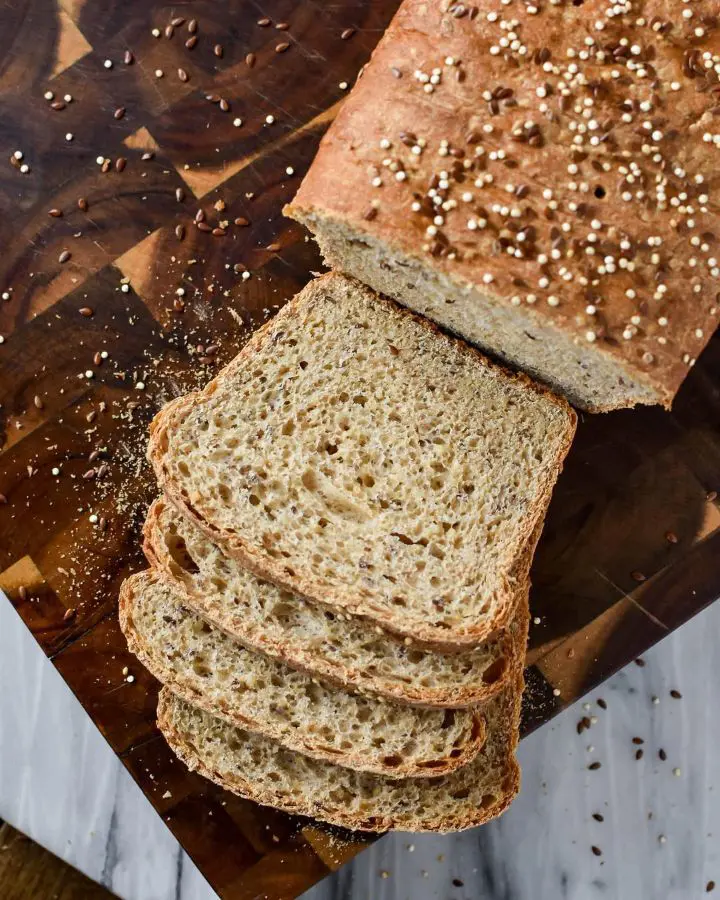Chia Seeds Benefits: 15 Reasons To Eat These Tiny Seeds
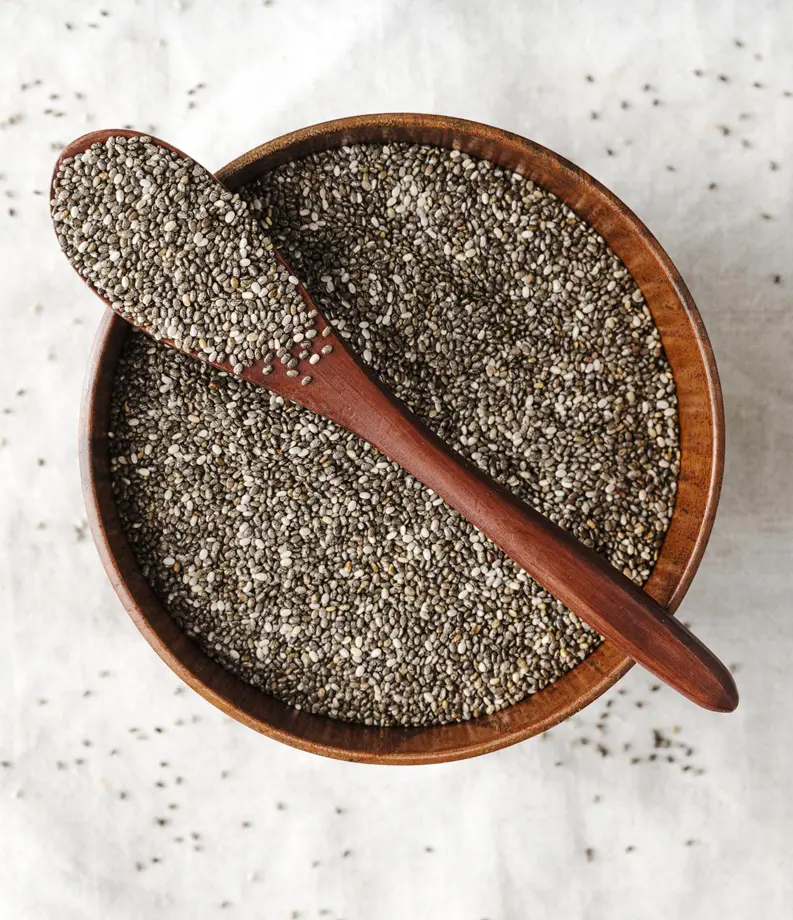
This post may contain affiliate links. If you make a purchase through links on our site, we may earn a commission.
Chia seeds are tiny edible seeds obtained from the plant known as "Salvia hispanica", belonging to the mint family. Oval, gray, and filled with black and white spots, these small seeds are highly valued for their abundant nutrients and health benefits.
There are many health benefits related to the consumption of chia seeds, some of them including improvement in heart health, bone strength, and better blood sugar control.
One or two tablespoons of chia seeds in the daily diet is a sufficient amount to get all the benefits that these seeds have to offer.
1. Increased Fiber Intake
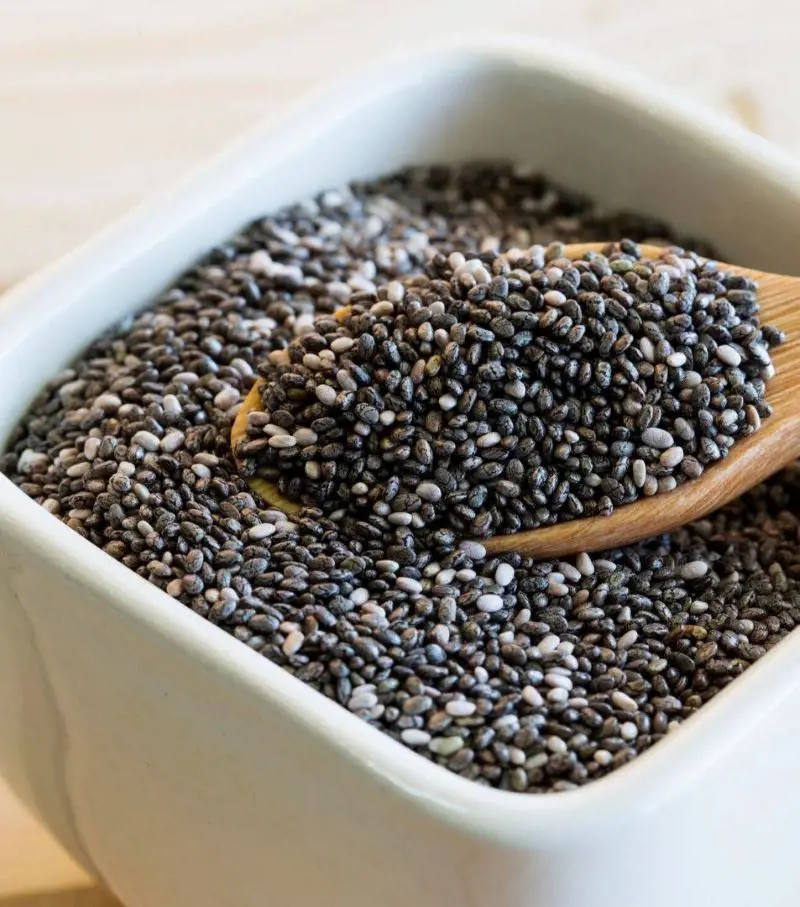
Chia seeds are among the foods rich in dietary fiber. About 28 grams of chia seeds have about 10 grams of fiber, most of them being soluble ones. Soluble fibers are especially known to have effects on digestive health, where they promote digestion and also add bulk to stool.
The overall fiber content in 28 grams/ 2 tablespoons of chia seeds meets 25% and 39% of the recommended daily intake for men and women, respectively.
Apart from directly helping in digestion, these fibers also make one feel full. So, chia seeds can be an important addition to the diet of individuals who want to abstain from overeating.
2. Increased Blood Levels of Omega-3 Fatty Acids
Chia seeds are one of the top sources of omega-3 fatty acids. This essential fat is considered very important in the functioning of the heart, brain and eye.
For vegetarians and vegans who can't add fatty fish to their diet to meet the daily requirement of omega-3 fatty acids, seeds like chia seeds are the best option. As the dietary requirement of omega-3 fatty acids is met, individuals are less likely to suffer from conditions like heart disease, arthritis and neurodegenerative conditions like Alzheimer's and Parkinson's.
The form of omega-3 fatty acid present in chia seeds is omega-3 ALA (Alpha-Lipoic Acid) which is converted later into active forms, like EPA (Eicosapentaenoic Acid), before your body can use it. Studies show that eating chia seeds can boost ALA in the blood by up to 138% and raise EPA levels by as much as 39%.
3. May Reduce Blood Sugar Levels

Fiber, fat, and protein, which are plentiful in chia seeds, have a very slow digestion rate. Also, the fiber forms a gel-like substance in the intestinal tract which slows down the rate of absorption of glucose in the gut.
This means there is a gradual secretion of glucose in the bloodstream, not sudden ones.
Due to this consistency in the blood glucose level, chia seeds can be considered a good friend of diabetics as well. Studies also suggest that chia seeds are beneficial for diabetes treatment.
4. May Support Bone Health
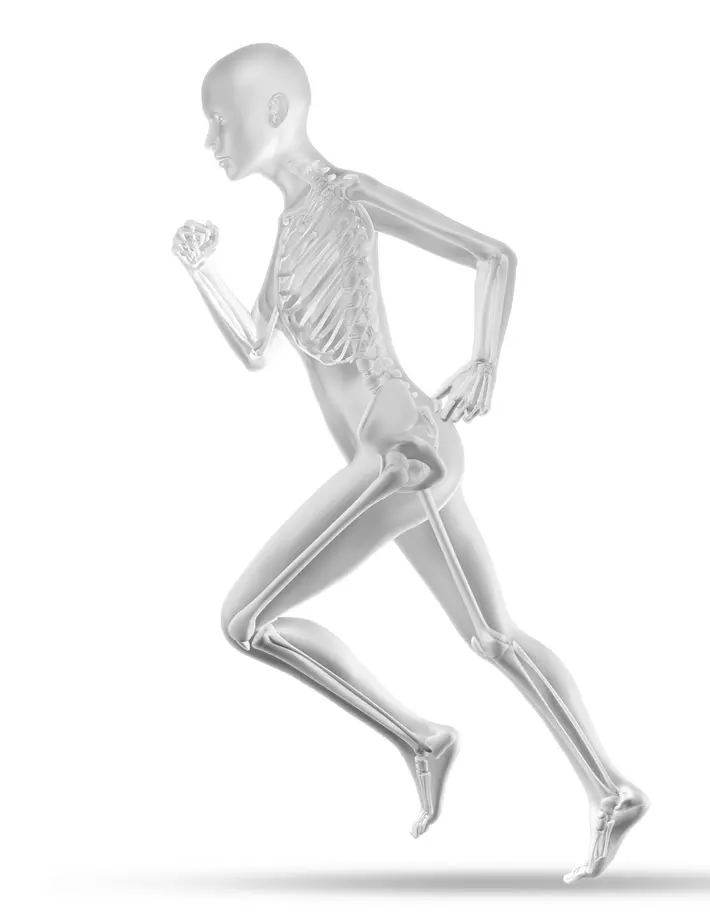
Calcium, phosphorus, and magnesium are essential nutrients needed for maintaining bone health. And the marvelous chia seeds have it all, 28 grams of chia seeds can help meet 14% daily value(DV) of calcium, 20% DV of phosphorus and 23% DV of magnesium.
As adequate levels of these nutrients are available in the body, the process of bone formation and bone density is maintained.
The regulation of these processes means you have healthy and stronger bones. Furthermore, the presence of ALA in chia seeds also helps to maintain the strength of bones.
5. May Support Weight Loss

The fiber and protein present in chia seeds may help people trying to lose weight. While research results vary, some studies have indicated that the abundant fibers present in chia seed might help prevent excess weight.
Also, chia's protein can be helpful in reducing appetite and food consumption.
Many studies have indicated that adding chia sides can accelerate weight loss; both in individuals who have a calorie deficit diet as well as who intake normal food. The main factors that lead to weight loss include the increased feelings of fullness. Consequently, the amount of food intake decreases.
Overall, chia seeds can be a valuable aid in your weight loss journey without compromising on essential nutrients.
6. May Lower LDL (Bad) Cholesterol
The soluble fiber in chia seeds is not only useful to regulate the blood sugar level, but it also equally allows your body to be free from excess bad cholesterol. The working principle however remains the same, the gel-like substance formed by the fiber allows the binding of cholesterol to it.
As a result, the chance of cholesterol getting absorbed and showing up on the blood reduces.
The omega-3 fatty acids in chia seeds also have a significant role to play. They help to balance the level of good cholesterol level hence helping to attain a healthy balance.
7. May Support Cardiovascular Health

Whenever we talk about the heart health benefits of chia seeds, omega-3 fatty acids in them have a major role to play.
The ALA present in these seeds is known to be capable of preventing inflammatory reactions in heart cells, which is a major reason behind complications like plaques in blood vessels and heart attacks.
In addition to omega-3 fatty acids, chia seeds also help by lowering bad cholesterol.
These cholesterols present in excess can lead to high blood pressure, heart failure, and even stroke in the long term.
8. May Improve Gut Health
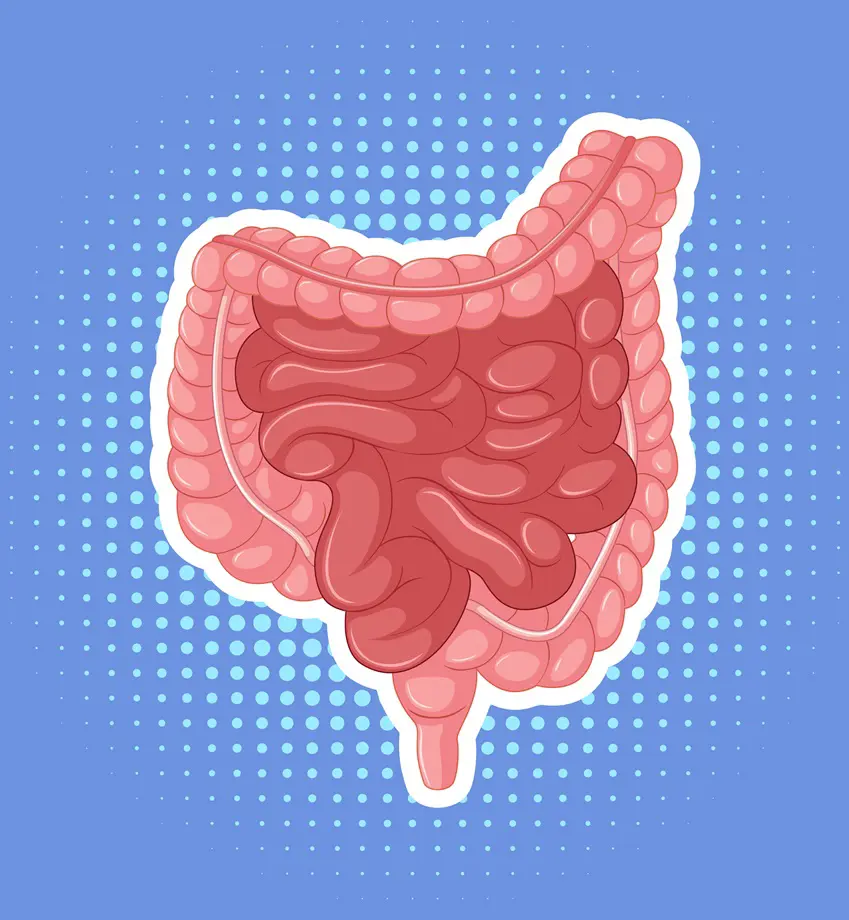
The presence of high fiber is what helps improve gut health. From making the digestion process smoother to making the passing of stool easier, chia seeds can be a perfect remedy for the digestive disorders you've been looking for.
Whenever the consumed chia seeds come in contact with liquid in the digestive tract, they tend to swell forming a gel. As the fibers are not digestible, they serve as a good source for the gut bacteria. This means they also help to maintain a balance in the number of good bacteria thereby helping digestion to function at peak.
The benefits don't stop here. With the anti-inflammatory properties of polyphenols and other compounds present in them, chia seeds also make sure that each and every gut cell is working fine.
9. Can Improve Skin Health

Rich in fat composition, chia seeds can help improve skin health. The omega-3 fatty acids in chia seeds can help capture the moisture of the skin, meaning the skin's hydration is locked in. In the long run, the skin won't have to lose its supple and soft nature.
The benefits of omega-3 fatty acids are not limited there. These fatty acids are also known to protect skin from UV rays, the formation of wrinkles and severe conditions like skin cancer. All these benefits are also contributions of chia compounds like antioxidants and anti-inflammatory molecules.
10. May Reduce Free Radicals and Inflammation
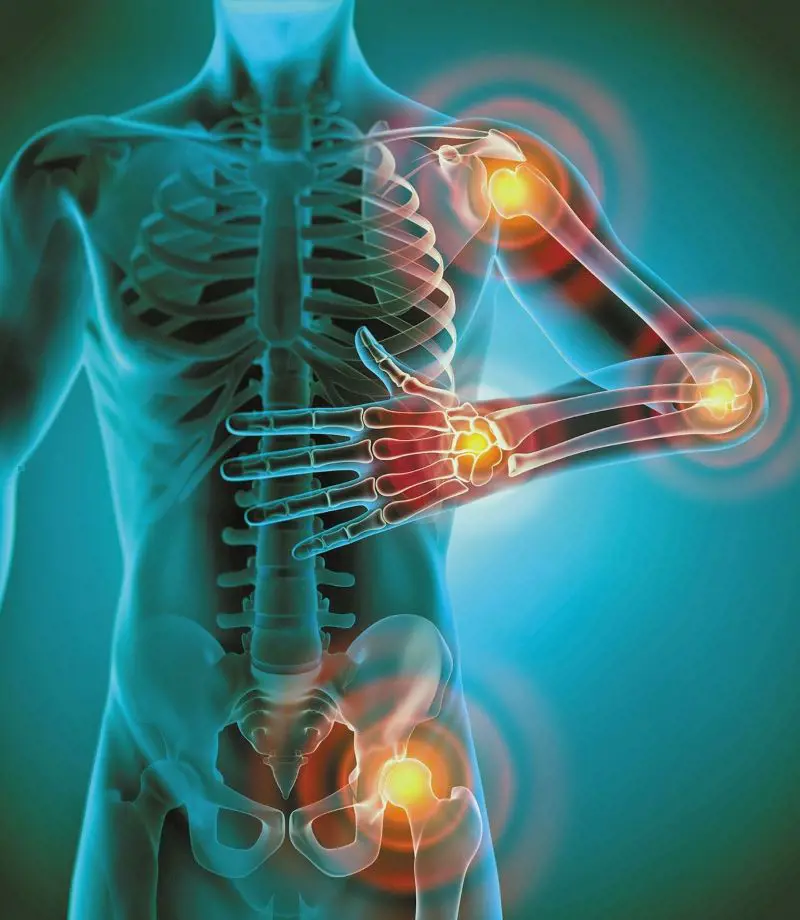
The increase of free radicals in the body is linked to the development of chronic inflammatory conditions like cancer. The fatty acids of chia seeds especially alpha-linolenic acid (ALA)can reduce the extent of chronic inflammation in the body
Antioxidants in chia seeds also have a notable role to play in inhibiting unnecessary inflammatory reactions in the body. As the haphazard production of free radicals is limited, there is very little chance of damage to proteins and nuclear materials of cells, making the health of the overall body sound.
11. Rich in Antioxidants
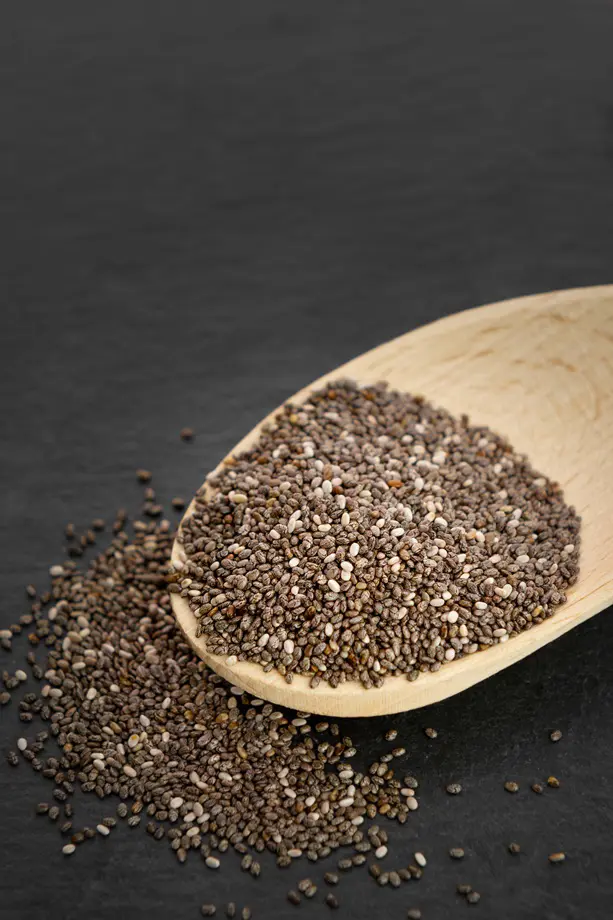
Chia seeds serve as an abundant source of antioxidants, which not only safeguard the sensitive fats in the seeds from going bad but also help the human body by countering harmful molecules called free radicals, which can damage cell compounds if they develop in your body.
The specific antioxidants in chia seeds include chlorogenic acid, caffeic acid, quercetin, myricetin, and kaempferol. These may all have protective effects on your heart and liver, as well as anticancer properties. For example, chlorogenic acid may help lower blood pressure, while caffeic acid has anti-inflammatory effects.
12. Boost Energy and Metabolism

Chia seed smoothies or snacks can be re-energizing foods. When talking about energy, 138 calories are present in 28 grams of chia seeds, mostly coming from complex carbohydrates, vitamins and minerals.
Complex carbohydrates have a unique property, they release energy slowly for a longer time. So, chia seeds can be the best food for people with high energy expenditure, such as people who do workouts.
The metabolic processes in our body can be smooth only when different nutrients are met. Chia seeds with their nutrients like vitamins, minerals and antioxidants, make sure metabolism is at its peak.
13. May Help Prevent Diverticulosis

Diverticulosis refers to a tube-like structure growth in the intestinal region due to an increase in pressure caused by sluggish movement of food. Not so common in young ones, people mainly above 50 suffer from this condition. The high fiber content of chia seeds is one of the best remedies for diverticulosis as it can help achieve smoother bowel movements.
Not only fibers, the water-absorbing capacity of chia seeds also can release pressure on the stomach. By helping absorb up to 12 times their weight in water, chia improves the motility of food in the intestine. Additionally, beneficial compounds present in chia can also stop inflammation of the intestinal cells, giving protection against any disorders.
14. Anti-Cancer Properties

Chia seeds have a good amount of amino acids known to have anti-cancer properties. Studies say that the extract of chia seeds can be used for cancer treatment due to their higher percentage of amino acids.
The antioxidants present in chia seeds can keep cells healthy and prevent the formation of cancer cells. Moreover, the high fiber content also plays a significant role in preventing cancers related to the digestive system.
15. May Improve Mood and Mental Health

The antioxidants and fatty acids present in chia seeds are known to make the occurrence of stress and anxiety less likely. Considered a brain superfood, chia seeds can also increase mental performance related to thinking and processing power. Not only that, chia seeds can help reduce the occurrence of severe disorders related to brain like Alzheimer's.
All these convincing benefits of chia seeds are due to the omega-3 fatty acids of chia seeds. The high concentration of these acids that can not be produced synthetically is considered a boon for brain health.
Chia Seeds: Nutrition Facts
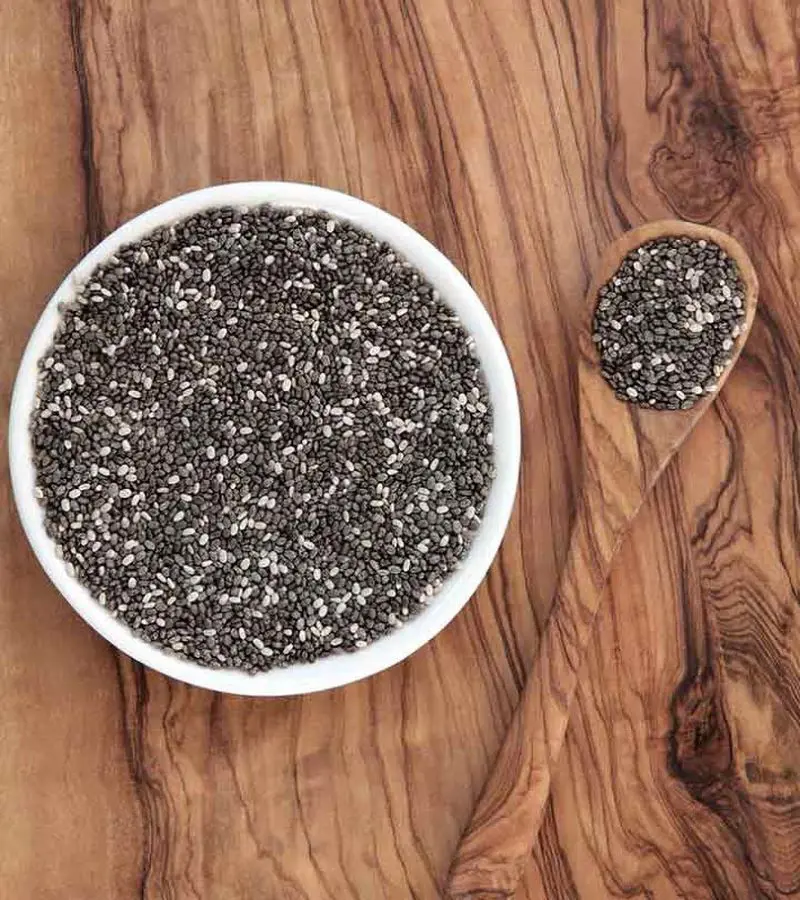
Ancient civilizations considered chia seeds highly nutritious, a belief supported by modern science. In fact, just one ounce (28.35 grams or two tablespoons) of chia seeds provides:
- Calories: 138
- Fat: 8.7 grams
- Protein: 4.68 grams
- Fiber: 9.75 grams
- Carbs: 11.9 grams
- alpha-linolenic acid (ALA): 5.05 grams
- Iron: 12% of the Daily Value (DV)
- Zinc: 12% of the DV
- Calcium: 14% of the DV
- Vitamin B1 (thiamine): 15% of the DV
- Vitamin B3 (niacin): 16% of the DV
- Magnesium: 23% of the DV
- Phosphorus: 20% of the DV
In addition, chia seeds are a complete protein since they contain all nine essential amino acids that your body cannot produce on its own. They supply a range of endogenous amino acids, which are essential for energy production and immune function in the body.
Potential Side Effects of Chia Seeds
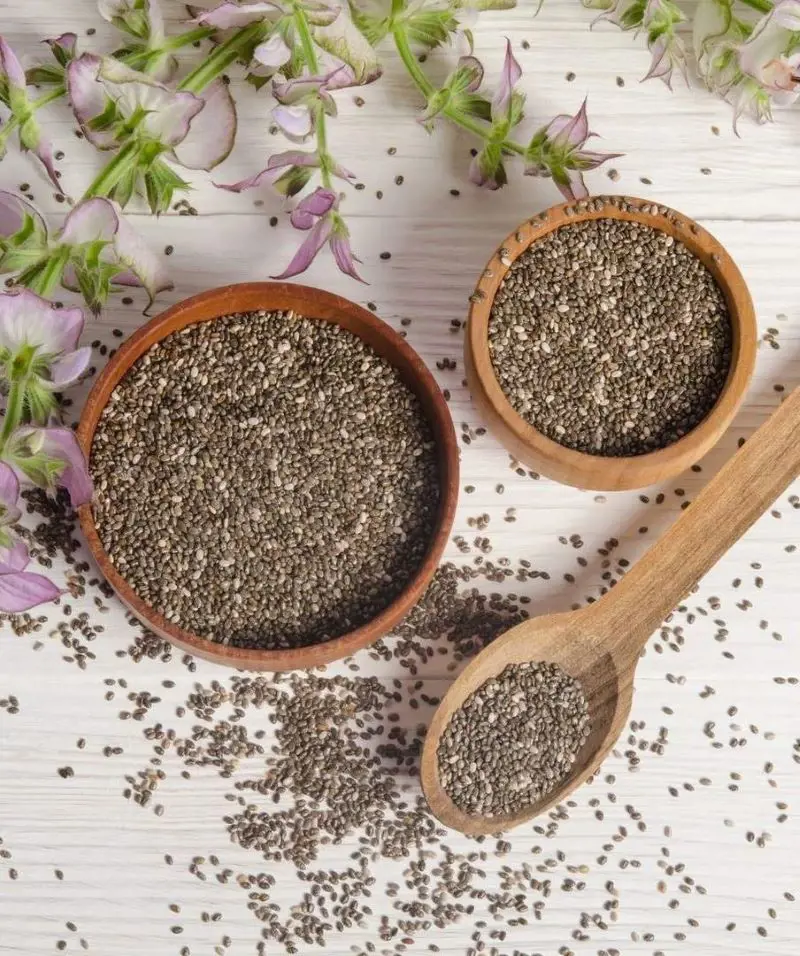
Chia seeds are popular for their benefits and there are no known adverse effects of consuming them. Nonetheless, to prevent any disorders it is recommended to include these seeds in the diet in limited amounts.
For people consuming treatment medicines, chia seeds should be consumed only after consulting their healthcare provider. Also, if there are signs of allergy it's best to stop consuming them.
Recent posts
Nutrition
Nutrition
Liquorice Root: Benefits And Uses
You can spell it liquorice or licorice; this herb or root has been in use for centuries in most medicinal applications, as a natural sweetener and to enhance flavors. Regarding its origins, it comes from the root of the "Glycyrrhiza galbre" plant and...
Nutrition
Is Ramen Healthy? Here's What Dietician Says
Ramen is a traditional dish from Japan that in the recent era has become a global phenomenon. This beloved and comforting soupy dish however has been questioned, when it comes to its nutrition. Best for those looking for a quick (instant), affo...
Nutrition
Is Wheat Bread Healthy? An Expert Picks
Wheat bread has been proudly celebrated as a dietary staple in countless homes for as long as people can remember. It has earned a reputation as a healthier alternative to white or any other processed bread, that no one can deny. Because of its evide...
Nutrition
Is Sausages Healthy? Nutrition And Health Benefits
Sausages are tasty in an addictive way, making them one of the most popular foods worldwide. You may have enjoyed this convenient food often, whether on a bun with mustard or grilled on a barbecue, the simple preparation methods are what makes its co...
Nutrition
Ice Cream Benefits: Nutrition, Potential Risks And Best Choices
Not gonna lie, ice cream is often taken as a guilty pleasure treat, a delightful treat that takes you to cloud nine but is frequently associated with negative health implications. Nonetheless, the happy news is when devoured mindfully, ice cream can ...
Nutrition
Is Sushi Healthy? Some Good and Bad Choices
Sushi is a wholesome meal and a beloved Japanese dish. The traditional sushi recipe is a simple combination of fresh fish, vegetables, and vinegared rice which is popular for its minimalistic preparation. As with any food, there are factors that dete...


